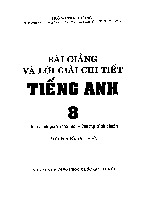













Preview text:
Unit Unit 5 MUSIC E AND AR THNIC GR OUR CUSTOMS TS OUPS OF VIE A T NAM ND TRADITIONS LESSON 4: COMMUNICATION Uni HOBBIES t LESSON 4: COMMUNICATION WARM-UP Discussion Vocabulary
Task 1: Listen and read the conversation. Pay attention to EVERYDAY the highlighted parts. ENGLISH
Task 2: Work in pairs. Make a similar conversation with the following situations.
Task 3: Read the text about the lion dance in Japan and
complete the table with the information from the text.
THE JAPANESE LION DANCE &
Task 4: Work in groups. Read Mai’s notes on the
VIETNAMESE UNICORN DANCE
Vietnamese unicorn dance. Compare the Vietnamese
unicorn dance with the Japanese lion dance. Wrap-up CONSOLIDATION Homework WARM-UP
- What the child is doing?
- Is she behaving well at the table?
Can you give me some examples of table manners? - Wait for the the table
arrangement before sitting down.
- Wait for the oldest people to start first. ... EVERYDAY ENGLISH
1 Listen and read the conversations. Pay attention to the highlighted sentences. should do should NOT do EVERYDAY ENGLISH Perhaps you should + V0 It’s a good idea to + V0 Don’t + V0
- Perhaps you should wait for the host to start eating.
- It’s a good idea to hand bowls with both hands.
- Don’t hit the bowl with your chopsticks. EVERYDAY ENGLISH
2 Work in pairs. Make similar conversations with the following situations.
Student A is travelling to Sa Pa in winter.
He / She doesn’t know what to wear. Student B gives advice. EVERYDAY ENGLISH
2 Work in pairs. Make similar conversations with the following situations.
Student A is going to a birthday party.
He / She doesn’t know what kind of gift
to bring. Student B gives advice.
THE JAPANESE LION DANCE & VIETNAMESE UNICORN DANCE
3 Read the passage and choose the correct title for it. JAPANESE LION DANCE Japanese name (1) ________ shishi- ____ mai ______ Occasions – (2) ______ New __ Y ____ ear ______ celebra____ tio _ ns – other important occasions Number of performers one or more Skills (3) ____ acr ____ oba ____ tics Dance partner no dance partner Musical instruments (4) ____ flu __ t _ es and drums Purposes
– to chase away (5) ____________ bad spirits – to bring good luck
THE JAPANESE LION DANCE & VIETNAMESE UNICORN DANCE
Work in groups. Read Mai’s notes on the Vietnamese unicorn dance. Compare the
4 Vietnamese unicorn dance with the Japanese lion dance.
What are the similarities and differences between two pictures?
THE JAPANESE LION DANCE & VIETNAMESE UNICORN DANCE
Work in groups. Read Mai’s notes on the Vietnamese unicorn dance. Compare the
4 Vietnamese unicorn dance with the Japanese lion dance. Example:
The Vietnamese unicorn dance and the
Japanese lion dance are both popular on New Year Festivals. CONSOLIDATION 1 Wrap-up
In this lesson, we have learn to: ✓ learn how to give advice
✓ practise using some grammar points
and vocabulary related to the topic. CONSOLIDATION 2 Homework
➢Do exercises in the workbook.
➢Compare Vietnamese Tet Holiday and Chinese Tet Holiday.
Website: hoclieu.vn
Fanpage: facebook.com/www.tienganhglobalsuccess.vn/
Document Outline
- Slide 1
- Slide 2
- Slide 3
- Slide 4
- Slide 5
- Slide 6
- Slide 7
- Slide 8
- Slide 9
- Slide 10
- Slide 11
- Slide 12
- Slide 13
- Slide 14




